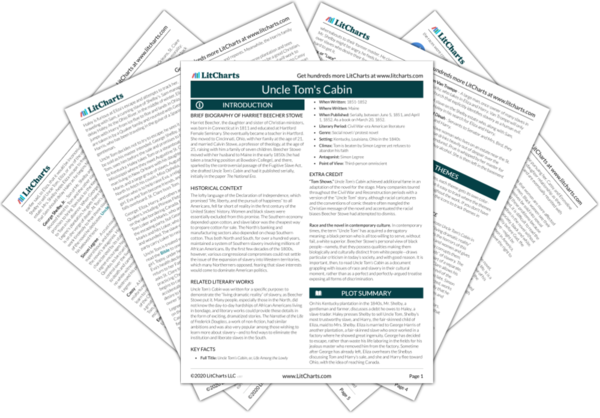Summary
Analysis
An Ohio state Senator named Bird is at home with his wife and children; he has recently been away at the capital in Columbus. Mrs. Bird asks her husband about a recent bill, just passed, banning the provision of food and drink to escaped slaves. Mrs. Bird finds the law un-Christian, but the Senator defends it, and his vote for it, by arguing the law would quell the public outcry erupting between slave and free states. Senator Bird says that his private feelings, which are not dissimilar to his wife’s, must remain separate from his public duty to maintaining peace and order.
The bill signed by Senator Bird mirrors, on the state level, the Fugitive Slave Act. Bird’s vote and argument are similar to those many northerners made on passage of that national bill. This argument underlines a fear in the north of chaos and the dissolution of the Union. Only when it became clear that slavery itself would dissolve the Union did opinion in the north turn against the institution of slavery. Before that, the north was willing to tolerate slavery in the South (and to profit from it without actually owning any slaves).
Themes
Literary Devices
Mrs. Bird asks her husband what he would do if an escaped slave came to their home, and the Senator responds that it would be a “painful,” but necessary, duty to turn her away. Sure enough, just then, Cudjoe, a black servant, informs Mrs. Bird that the two runaways, Eliza and Harry, have arrived. Mrs. Bird promises them shelter and food, and the Senator, despite his previous statements, warms to their case and tells his wife to make the runaways comfortable.
The timing here is quite fast and the coincidence enormous, but it seems more important to Beecher Stowe that Bird’s “conversion” from pragmatic politician to man of feeling be shown. His care for the escapees is a male form of the family concern Eliza and other women have shown toward their children.
Themes
Eliza begins telling her story. The Birds reveal that they have recently lost a child, and Mrs. Bird, the children, and a female slave, Dinah, weep as they hear of Eliza’s heart-wrenching decision to risk her life for Harry, and of George’s cruel master. The Senator resolves to drive Harry and Eliza that night to a friend’s house seven miles away, over a bumpy and little-used back road. Mrs. Bird rejoices privately in her husband’s change of heart. The Senator also tells his wife to offer Harry their dead child Henry’s clothes.
This coincidence further draws a parallel between blacks and whites—both wish to protect and love their children. The fact that both children are named “Henry” is perhaps an overwhelming coincidence, but the point is made that a parent’s love for his or her child transcends race and social status.
Themes
Beecher Stowe claims that the Senator only knew fugitive slaves in the abstract, thus allowing him to argue for the passage of the state’s strict no-aid law. Bird and Cudjoe drive Eliza and Harry slowly over the slushy road, often stopping to remove the carriage from a rut or put it on rails over the mud.
An important distinction in the novel. Beecher Stowe tells her story as a novel, rather than as a political tract, because the specific example of Tom’s and other’s lives might be more persuasive than an abstract argument.
Themes
Get the entire Uncle Tom's Cabin LitChart as a printable PDF.

After a long night’s ride, they meet John Van Trompe at his house. Van Trompe, a burly, bearded Kentuckian, has recently freed his slaves after believing privately for some time that the institution is immoral. Now living in the free state of Ohio, he agrees to shelter Eliza and Harry, and says his equally burly sons will protect them. Van Trompe claims, after hearing Eliza’s story, that he never joined a church till he found one that understood slavery as explicitly immoral. The Senator places Eliza and Harry in Van Trompe’s care, then leaves for Columbus in order to avoid suspicion of his night’s journey.
Van Trompe represents a kind of person (St. Clare and George Shelby are others) who comes to realize, eventually, that slavery is too great an evil to be allowed to continue. Van Trompe even goes so far as to move from Kentucky to a “free” state where slavery is illegal. Furthermore, he only attends a Christian church that refuses to make excuses for slavery, but instead uses the Bible to prove it's evil.
Themes












